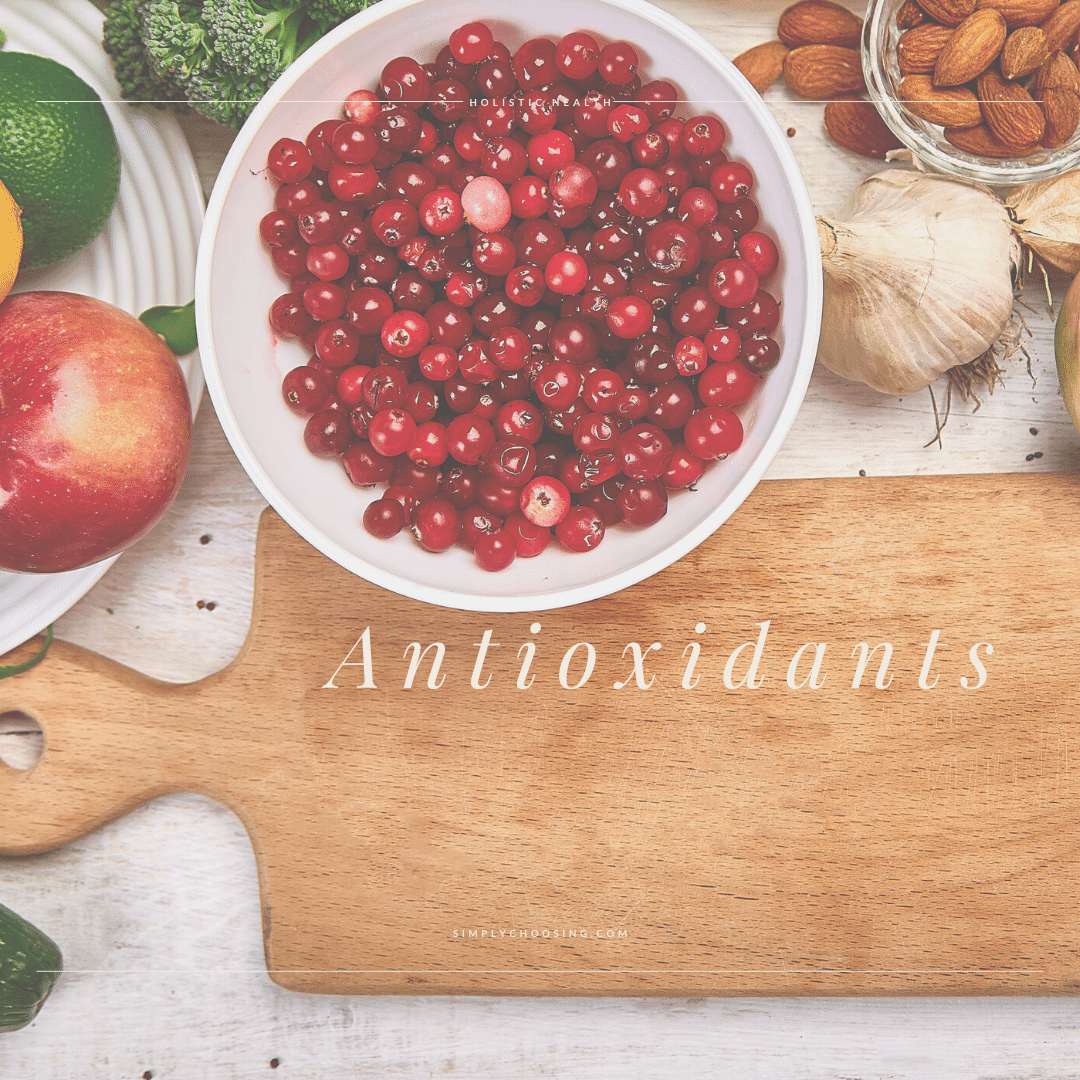Disclosure: Please note that this post may contain affiliate links, meaning that I get a commission if you decide to make a purchase through my links, at no cost to you. Please refer to my Privacy Policy for more information.
What you will get from this blogpost:
- Build a basic knowledge of what antioxidants are.
- Understand the power of antioxidants and how they affect your overall health.
- List 13 antioxidant sources that you can include in your diet today.
Antioxidants? A weird word, but once you understand the power of antioxidants, you wouldn’t mind shouting “Antioxidants!” to the world and making others aware of this magical word.
Yes, that’s how powerful these molecules are in your body. If you’ve heard of them before, you may or may not know what exactly they are and how they affect your life. Well, that’s exactly what we’re going to discuss in this blog post, so just keep reading.
THE IMPORTANCE OF RAINBOW-FOODS
Ever wonder why fruits and vegetables are colored yellow, orange, red, green, purple, or even blue?
All plant-based foods we consume have natural pigments that, according to a study published in 2016 in Current Opinion in Food Science, have potential health benefits, such as preventing cancer, improving heart health, or curing depression, depending on their color pigments.
- Beta-carotene makes carrots orange,
- Chlorophyll gives vegetables such as kale and collard greens their green color,
- and anthocyanins give blueberries their beautiful blue color.
As noted in the study, there are hundreds of different pigments filled with certain substances that act as antioxidants.
So, what are Antioxidants?

Antioxidants are molecules in the body that help protect cells from damage caused by potentially harmful molecules called free radicals.
Generally speaking, these antioxidants keep our immune system intact and keep us strong and healthy.
The body has its own antioxidants to keep free radicals at bay, but the environment makes it difficult for the body to produce enough antioxidants on its own.
Fortunately, antioxidants are also found in food, especially fruits, vegetables, and other plant-based, whole-foods.
The best known antioxidants in foods
- Vitamin C
- Vitamin E
- Lutein
- Beta-carotene and other related carotenoids
- Minerals such as selenium and magnesium
Free Radicals aka Oxidative Stress
When talking about antioxidants, free radicals are always a part of it.
Free radicals are highly reactive molecules that can cause health problems in the long run. Unfortunately, free radicals are produced both naturally and by the environment in which we move.
Free radicals, if accumulated, cause oxidative stress, which damages your DNA and other important structures in your cells including aging, inflammatory conditions, and high blood pressure.
Moreover, oxidative stress is associated with numerous diseases, including heart disease, diabetes, Alzheimer’s, depression, and cancer.
Oxidative stress can be managed through a healthy diet, as you will learn in the next section.
Furthermore, healthy lifestyle changes can prevent or reduce oxidative stress, including:
- A regular and moderate exercise routine
- Using sunscreen, ideally without chemicals
- Being cautious of chemicals in general
- Not smoking, as well as avoiding exposure to secondary smoke
- Decreasing or quitting alcohol intake altogether
So, why is an antioxidant-rich diet so powerful?
Antioxidants help prevent or slow damage to your cells. That, we know now.
Michael Greger, M.D., author of “How Not to Die,” explains in his book that there are many sources of antioxidants, but that in general, plant-based sources would provide the best source.
As Michael Greger, M.D., explains, a nationwide U.S. study measuring levels of carotenoid phytonutrients in the blood showed exemplary results: People with higher fruit and vegetable consumption had a lower risk of depression and felt healthier overall.
People with higher fruit and vegetable consumption had a lower risk of depression, and felt healthier overall.
However, this was not true for people who took antioxidant pills instead. So be aware that a vitamin C supplement does not have the same effect on your body as, for example, a fresh lemon.
If an antioxidant-rich diet, namely a plant-based whole-foods diet (PBWF), can indeed lower the risk of depression and make people healthier, it certainly can reverse, prevent or lower the risk of other common diseases.
There are countless foods that are rich in antioxidants. Here are 13 reliable sources.
13 healthy foods high in Antioxidants
1. Berries

Berries are the healthiest fruits you can eat, with nearly ten times more antioxidants than any other fruit. They offer potential protection against various cancers, boost your immune system, and support the liver and the brain.
As Michael Greger, M.D. says: “Tastes great and may help you live longer? Yes.”, that is exactly what berries do.
List of berries include:
- Acai berries
- Blackberries
- Blueberries
- Goji berries
- Mulberries
- Raspberries
- Strawberries
- Cranberries
2. Broccoli

Cruciferous vegetables such as broccoli are a lifesaver. They offer potential prevention of DNA damage and fight various cancers including breast cancer and prostate cancer.
On top of that, they defend your body against pathogens and pollutants and boost your liver detox enzymes.
List of other cruciferous vegetables include:
- Rocket
- Bok choy
- Brussel sprouts
- Caggabe
- Cauliflower
- Horseradish
- Collard greens
- Watercress
3. Dark Chocolate

Who would have thought that the sweet mouthwatering chocolate has some powerful nutrients in it?
With its high antioxidant content, dark chocolate has even more than our beloved blueberry. Dark chocolate has been linked to health benefits such as less inflammation and reduced risk factors for heart disease.
When choosing dark chocolate, look for bars with a cocoa content of 70% or more. Dark chocolate with a higher cocoa content contains a higher concentration of antioxidants and nutrients and therefore more benefits than chocolate with a lower cocoa content.
4. Spinach

Leafy green vegetables, especially spinach, are loaded with vitamins, minerals, and antioxidants, and are incredibly low in calories.
Moreover, Spinach is one of the best sources of the antioxidant lutein, which promotes eye health and reduces the risk of macular degeneration.
List of other leafy green vegetables include:
- Kale
- Collard Greens
- Beet Greens
- Romaine Lettuce
- Argula
- Bok choy
- Swiss Chard
5. Beans

Beans are legumes that are inexpensive and incredibly healthy.
They provide next to protein, fiber, iron, and vitamins a great number of antioxidants. In combination with these sources, beans have been linked to impressive health benefits, such as reduced chronic inflammation and suppressed cancer growth, as well as improved gut and heart health.
List of beans include:
- Lima beans
- Black beans
- Black-eyed peas
- Soybeans
- Kidney beans
- Pinto beans
- Red beans
- Chickpeas
6. Flaxseeds

Being one of the oldest crops available, flaxseeds have been promoted for their health benefits for centuries.
Flaxseeds are packed with nutrients including fiber, protein, polyunsaturated fatty acids such as alpha-linolenic acid (ALA), omega-3, and lignans, which appear to have antioxidant properties.
According to some scientists, flaxseed may be over 800 times richer in lignans, than most other plant-based sources.
Among other things, flaxseed may reduce cancer risk, improve cholesterol and heart health, and stabilize blood sugar.
7. Nuts and Seeds

Nuts are rich in fiber, protein, and unsaturated fats, and make excellent snacks during the day.
Walnuts in particular have higher antioxidant activity than any other nut. Years of research by scientists around the world show that regular consumption of small amounts of nuts or nut butter reduces the risk of heart disease, cancer, type 2 diabetes gallstones, and other health problems.
List of other nuts include:
- Almonds
- Pistachios
- Cashews
- Pecans
- Macadamia nuts
- Brazil nuts
- Hazelnuts
- Peanuts
8. Beets

Beet belongs to the same family as chard and spinach, whereby both the leaves and the root can be consumed – the leaves have a bitter taste, while the root is sweet.
Red beet, in particular, is rich in important vitamins, minerals, and antioxidants. In fact, they contain almost all the vitamins and minerals you need.
Among other things, beet can prevent the growth of cancer cells, reduce blood pressure, improve gut and brain health, and has an energizing effect.
9. Sweet Potatoes

Sweet potatoes are a starchy, sweet-tasting root vegetable that comes in a variety of colors, sizes, and shapes. They are a good source of fiber, vitamins, and minerals.
In particular, the orange and purple varieties are also incredibly rich in beta-carotene, the antioxidant responsible for the vegetable’s bright color.
Sweet potatoes have health benefits including preventing cancer growth, promoting gut, brain, and eye health, fighting type 2 diabetes, and supporting the immune system in a variety of ways.
10. Artichokes

And here comes the absolute underdog: the artichokes.
Artichokes are often found in dips or as an addition to salads. Unfortunately, their health benefits are underestimated.
They are low in fat and a rich source of vitamins A, K, C, B-6, thiamin, riboflavin, niacin, folic acid, calcium, iron, zinc, potassium, magnesium, phosphorus, and zinc to name a few.
Above all, artichoke contains the highest level of antioxidants of all vegetables.
The alleged health benefits of artichokes include lowering cholesterol and blood sugar levels, improving digestion, regulating blood pressure, and heart and liver health.
11. Red Onions

Onions contain various vitamins, minerals, and potent phytochemicals that have been shown to promote health in many ways.
Since ancient times, the medicinal properties of onions have been known to cure headaches and heart disease, among other ailments.
They are an excellent source of antioxidants, containing over 25 different types of flavonoid antioxidants.
In particular, red onions can promote heart health, fight cancer, control blood sugar, increase bone density and improve intestinal health.
12. Herbs and Spices

Since ancient times, herbs and spices have been used in many ways. They have been added to foods to improve flavor but are also used as preservatives and in medicine.
Antioxidants from herbs and spices are a large group of bioactive compounds consisting of flavonoids, phenolic compounds, sulfur-containing compounds, tannins, alkaloids, phenolic diterpenes, and vitamins.
A variety of health benefits can be attributed to herbs and spices, including improved heart health, lowered blood sugar, improved brain function, and improved gut health.
List of spices with the highest antioxidants content:
- Turmeric
- Ginger
- Cloves
- Peppermint
- Cinnamon
- Oregano
- Thyme
- Sage
- Rosemary
13. Matcha

The Japanese have known and used matcha for a long time. A few years ago it also found its way to the Western world.
Much like green tea, matcha is derived from the Camellia sinensis plant.
Due to its unique growth and harvesting process, however, it contains a higher level of nutrients, which results in more caffeine and antioxidants than ordinary green tea.
Health benefits of matcha include weight loss, prevention of cellular damage, detoxification, stabilization of blood sugar levels, protection of the liver, promotion of brain function, cancer prevention, and promotion of heart health.
The Bottom Line
Antioxidants are essential for the survival of all living things, including us humans. Without them, we would feel sick and be at risk of many diseases that could eventually kill us.
A plant-based, whole-food diet can provide your body with enough antioxidants. Just remember to put as many colors as possible on your plate every day.
It’s not as hard as you think. By preparing a green smoothie for breakfast, eating a green salad for lunch, and ending your day with a colorful Buddha bowl, you’re sure to have all the antioxidants you need.
And besides all the health benefits listed, they also taste super delicious, don’t they?





0 Comments